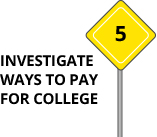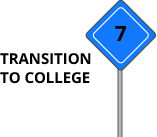ForwarDirections college counselors guide and support students by using our proven “7 Steps to Success”. This allows us to focus on each individual student using a comprehensive and customized approach.

 DISCOVER WHO students are and WHAT is important to them.
DISCOVER WHO students are and WHAT is important to them.
We believe that our First Steps Process is a vitally important way to start. It begins by focusing on who each student is as a person and as a student. This includes having students investigate their personalities, their interests, and their career aspirations, as well as seek input about those things from immediate family members. This process is the key to students understanding what is important to them in life, including thinking through their hopes and aspirations–all of which lays important groundwork before they explore their career and college options. It also allows us, as their independent college counselors, to get to the know each student in enough depth that we can be of help to them through the 7 Steps to Success Process. At the conclusion of this step, we present a fully customized analysis of each student.
 CLARIFY a CAREER PATH, including jobs of interest and college majors.
CLARIFY a CAREER PATH, including jobs of interest and college majors.
We guide students through a series of activities to help them identify multiple career categories that are of interest to them. Then we help them explore a wide variety of job options within each of those categories. Students gain an understanding of what choices are available and what each job entails. Finally, we help students explore what college majors best fit each of their career objectives. Throughout this exploration process, we refer students back to what they learned about themselves through the First Steps Process to make sure that their career path is aligned with who they are and what is important to them. At the conclusion of this step, each student has developed a customized list of career options, including specific jobs of interest, and related college majors.
 IDENTIFY COLLEGES, or other post-secondary paths, that are academic, social, and financial fits.
IDENTIFY COLLEGES, or other post-secondary paths, that are academic, social, and financial fits.
We have students start this step by thinking through what their priorities are in terms of choosing a college. That includes establishing what makes a college a good academic, social, and financial fit for each student. Then we help students search through all of the college and appropriate post-secondary path options that are available to them to identify which specific ones best meet their needs. Those options can include 4-year universities, community colleges, trade schools, military academies, and/or gap semesters/years. We make recommendations to expand or narrow each student’s college list as needed. At the conclusion of this step, each student has created a customized list of colleges that are good matches for them.
 APPLY TO COLLEGE, which includes dealing with essay writing, completing forms, and meeting deadlines.
APPLY TO COLLEGE, which includes dealing with essay writing, completing forms, and meeting deadlines.
We walk students through the entire application process for each college that they choose to apply to. This includes supervising students as they fill out each application. We help them craft artful college admission essays that directly address each prompt, drawing on each student’s individual life experiences. Our process helps students keep the application process organized and to keep track of all submission deadlines. We also provide guidance about gathering letters of recommendation, when to make college visitations, and how to get the most out of the visit, as well as how best to network with college officials. When students have the opportunity to be interviewed, we educate them about proper interview etiquette and provide them with a variety of practice questions. Whether applying for early decision, early admission, or regular admission, we are there—guiding students and their parents throughout the process. At the conclusion of this step, students will have applied to an appropriate number of college options to fit their customized career plan.
 INVESTIGATE ways to PAY FOR COLLEGE, including seeking out and applying for scholarships and grants, and helping families complete the FAFSA.
INVESTIGATE ways to PAY FOR COLLEGE, including seeking out and applying for scholarships and grants, and helping families complete the FAFSA.
We provide both tools and advice to help our students and their families figure out how to pay for college. Through an ongoing process, we make sure they are aware of what the potential cost of a college education will be so they are prepared to deal with that reality in the future. We have processes in place to help identify ways to fund a college education in addition to a family’s contribution, including all available types of financial aid (scholarships; grants from federal, state, and local sources; work study programs; and student loans). Students and parents are given specific guidance about the completion of the FAFSA and if and when it is required, the CSS Profile. At the conclusion of this process, students and their families fully understand what the costs will be for attending their college of choice and have developed a plan to pay for it.
 DISCERN which COLLEGE OFFER is best.
DISCERN which COLLEGE OFFER is best.
We help students identify which college offer is the best academic, social, and financial fit for them by offering insight into each one of those aspects. We help interpret each college’s financial aid package and discuss strategies to address gaps in financial aid. The importance of making final college visits is discussed so students and their families can make informed decisions. Students are given specific strategies about how to accept an offer, as well as how to decline one. In addition, we guide students in making vital connections with people within the specific departments they will be working in during their time in college. At the conclusion of this step, students have accepted one college offer and are ready to begin the transition phase.
 TRANSITION successfully from HIGH SCHOOL TO COLLEGE.
TRANSITION successfully from HIGH SCHOOL TO COLLEGE.
We want our students to feel as confident as possible when they set foot on their college campuses as new students. So, we help students keep track of impending deadlines and make sure they understand how important it is to follow-through with things like signing up for campus housing, registering for coursework, attending college orientations, knowing what to pack and when to move to college, and setting academic and personal goals for their freshman year. We give students strategies so they know how to have positive interactions and create relationships with key people in their college departments, the financial aid office, and the activities center. At the conclusion of this step, students will have a plan about what needs to be done before they start college and what they hope to accomplish during their first semester.
